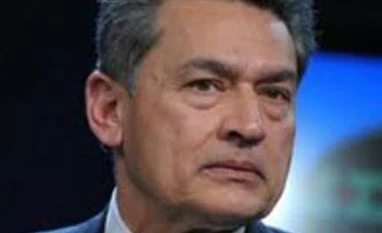A federal judge rejected former Goldman Sachs Group Inc director Rajat Gupta's request to throw out his insider trading conviction and prison sentence, even after an appeals court last year made it harder to prosecute tipping cases.
Gupta (pictured), 66, convicted in 2012 and now serving a two-year prison term in Massachusetts, argued that he should be released because the US failed to prove he got a personal benefit for passing tips to his friend, billionaire hedge fund manager Raj Rajaratnam.
In December, an appeals court said prosecutors must prove defendants knew tips came from someone who had a duty to keep them secret and got a benefit for leaking them. That ruling imperiled several convictions obtained by Manhattan US Attorney Preet Bharara.
A federal jury in New York found him guilty of passing tips to Rajaratnam about Berkshire Hathaway Inc's $5 billion investment in Goldman Sachs and the bank's financial results for two quarters in 2008.
After unsuccessfully pursuing an appeal up to the US Supreme Court, Gupta in March asked US District Judge Jed Rakoff, who had presided over his trial, to overturn the jury's verdict in light of the December appellate decision.
'A tipper'
Rakoff on Thursday rejected Gupta's arguments, saying his circumstances were different.
"Gupta was convicted as a tipper," Rakoff ruled. "As the Supreme Court has repeatedly made clear, a tipper is liable for securities fraud if he takes sensitive market information."
The judge cited evidence including conversations secretly recorded by the US that showed Gupta passed nonpublic information to Rajaratnam, with whom he had a business relationship.
Rajaratnam, 58, is serving an 11-year sentence in the same federal prison medical facility as Gupta for masterminding a multimillion-dollar insider scheme. Gupta is scheduled to be released in March, according to the Bureau of Prisons website.
Gupta's lawyer, Gary Naftalis, couldn't immediately be reached for comment on the ruling.
Gupta (pictured), 66, convicted in 2012 and now serving a two-year prison term in Massachusetts, argued that he should be released because the US failed to prove he got a personal benefit for passing tips to his friend, billionaire hedge fund manager Raj Rajaratnam.
In December, an appeals court said prosecutors must prove defendants knew tips came from someone who had a duty to keep them secret and got a benefit for leaking them. That ruling imperiled several convictions obtained by Manhattan US Attorney Preet Bharara.
More From This Section
Gupta, also a former McKinsey & Co managing partner, is the highest-profile executive convicted in the US crackdown on insider trading at hedge funds and lost earlier bids to reverse the verdict.
A federal jury in New York found him guilty of passing tips to Rajaratnam about Berkshire Hathaway Inc's $5 billion investment in Goldman Sachs and the bank's financial results for two quarters in 2008.
After unsuccessfully pursuing an appeal up to the US Supreme Court, Gupta in March asked US District Judge Jed Rakoff, who had presided over his trial, to overturn the jury's verdict in light of the December appellate decision.
'A tipper'
Rakoff on Thursday rejected Gupta's arguments, saying his circumstances were different.
"Gupta was convicted as a tipper," Rakoff ruled. "As the Supreme Court has repeatedly made clear, a tipper is liable for securities fraud if he takes sensitive market information."
The judge cited evidence including conversations secretly recorded by the US that showed Gupta passed nonpublic information to Rajaratnam, with whom he had a business relationship.
Rajaratnam, 58, is serving an 11-year sentence in the same federal prison medical facility as Gupta for masterminding a multimillion-dollar insider scheme. Gupta is scheduled to be released in March, according to the Bureau of Prisons website.
Gupta's lawyer, Gary Naftalis, couldn't immediately be reached for comment on the ruling.
)